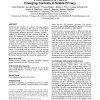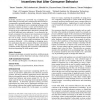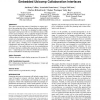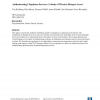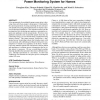HUC
2009
Springer
14 years 4 months ago
2009
Springer
Mobile privacy concerns are central to Ubicomp and yet remain poorly understood. We advocate a diversified approach, enabling the cross-interpretation of data from complementary m...
HUC
2009
Springer
14 years 4 months ago
2009
Springer
Intelligibility can help expose the inner workings and inputs of context-aware applications that tend to be opaque to users due to their implicit sensing and actions. However, use...
HUC
2009
Springer
14 years 4 months ago
2009
Springer
Economic incentives are a powerful way of shaping consumer behavior towards more commercially efficient and environmentally sustainable patterns. In this paper, we explore the id...
HUC
2009
Springer
14 years 4 months ago
2009
Springer
Personal energy consumption, specifically home energy consumption such as heating, cooling, and electricity, has been an important environmental and economic topic for decades. De...
HUC
2009
Springer
14 years 4 months ago
2009
Springer
This paper explores the nature of interfaces to support people in accessing their files at tabletop displays embedded in the environment. To do this, we designed a study comparin...
HUC
2009
Springer
14 years 4 months ago
2009
Springer
: © Authenticating Ubiquitous Services: A Study of Wireless Hotspot Access Tim Kindberg, Chris Bevan, Eamonn O'Neill, James Mitchell, Jim Grimmett, Dawn Woodgate HP Laborator...
HUC
2009
Springer
14 years 4 months ago
2009
Springer
We describe a technique to detect the presence of computer users. This technique relies on sonar using hardware that already exists on commodity laptop computers and other electro...
HUC
2009
Springer
14 years 4 months ago
2009
Springer
This paper attempts to re-imagine ubiquitous computing for populations in low-income and information-challenged environments. We examine information infrastructures in midsized ur...
HUC
2009
Springer
14 years 4 months ago
2009
Springer
Detecting visits to semantically meaningful places is important for many emerging mobile applications. We present PlaceSense, a place discovery algorithm suitable for mobile devic...
HUC
2009
Springer
14 years 4 months ago
2009
Springer
A key prerequisite for residential energy conservation is knowing when and where energy is being spent. Unfortunately, the current generation of energy reporting devices only prov...
